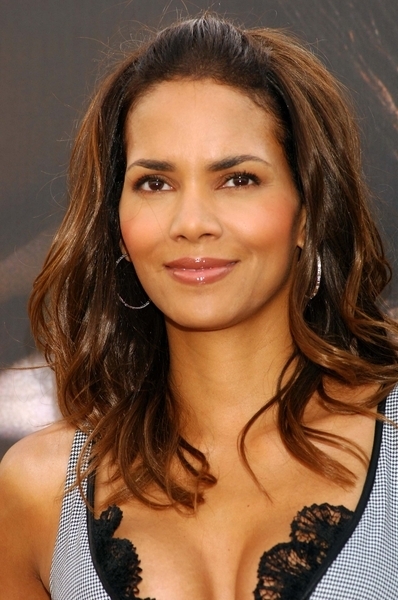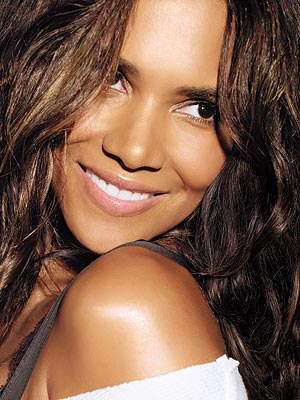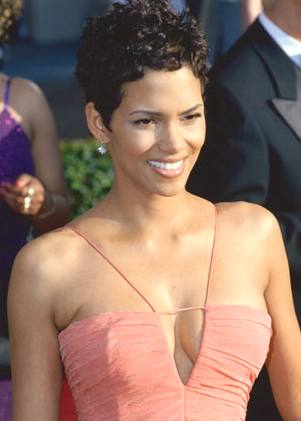Halle Berry
A woman whose combination of talent, tenacity, and beauty has made her one of Hollywood's busiest actors, Halle Berry has enjoyed a level of success that has come from years of hard work and her share of career pitfalls.
Berry's interest in show business came courtesy of her participation in a number of beauty pageants throughout her teens, including the 1986 Miss U.S.A. Pageant. A native of Cleveland, OH, where she was born to an African-American father and white mother on August 14, 1968, Berry was raised by her mother, a psychiatric nurse, following her parents' divorce. At the age of 17, she appeared in the spotlight for the first time as the winner of the Miss Teen All-American Pageant, and subsequently became a model. Berry won her first professional acting gig on the TV series Living Dolls, and then appeared on Knots Landing before winning her first big-screen role in Spike Lee's Jungle Fever. It was on the set of the film that she first earned her reputation for her full commitment to acting, reportedly refusing to bathe for weeks in preparation for her portrayal of a crack addict.
Following her film debut, Berry was cast opposite Eddie Murphy in Boomerang (1992) as the comedian's love interest; not only did she hold her own against Murphy, but the same year she did acclaimed work in the title role of the Alex Haley miniseries Queen, playing a young woman struggling against the brutal conditions of slavery.
However, critical opinion of the actress' work was overwhelmingly favorable in 1998, when she starred as a street smart young woman who comes to the aid of a bumbling politician in Warren Beatty's Bullworth. The following year, Berry won even greater acclaim -- and an Emmy and Golden Globe -- for her turn as tragic screen siren Dorothy Dandridge in the made-for-cable Introducing Dorothy Dandridge. Unfortunately, any acclaim Berry enjoyed was overshadowed by her widely publicized brush with the law in February of 2000, when she allegedly ran a red light, slammed into another car, and then left the scene of the accident. The actress, who suffered a gash to her forehead (the driver of the other car sustained a broken wrist), was booked in a misdemeanor court in early April of that year.
Fortunately for Berry, her subsequent onscreen work removed the spotlight from her legal troubles; that same year, she starred as Storm in Bryan Singer's hugely successful adaptation of The X-Men. Working alongside a cast that included Ian McKellen, Hugh Jackman, Famke Janssen, and Anna Paquin, Berry was hailed for her work as the first African-American comic book heroine on the screen. Acclaim was not quite as forthcoming for her work opposite John Travolta in Dominic Sena's cheesy thriller Swordfish, which touted itself as the first movie to feature Berry baring her breasts. Unfortunately, it didn't allow for equal exploitation of the talents that Berry possessed above her collarbone.
Although her turn in the James Bond flick Die Another Day was so successful that talk began of a spin-off film, Berry's first true post-Oscar vehicle Gothika proved to be unpopular with both critics and moviegoers. Luckily, 2003 wasn't a total loss for her though as X2: X-Men United was a box-office smash and was regarded by many to be superior to its predecessor. Sticking with comic-books as source-material, Berry could be seen in Catwoman the following Summer. The film was the biggest flop of her career, panned by audiences and critics, and earning the actress a coveted Razzie for her terrible performance. She won back a great deal of respect, however, by starring in the made for TV adaptation of the Zora Neale Hurston novel Their Eyes Were Watching God the next year. She followed this moving performance with a return to her X-Men comrades for X-Men: The Last Stand in 2006, then signed on to star alongside a decidedly creepy Bruce Willis in the suspense thriller Perfect Stranger (2007), directed by James Foley. In that film, she portrayed a hard-nosed reporter prone to catching and indicting sleazebags, who becomes unduly implicated with a pathological corporate big wig responsible for murdering his wife (Willis). The film netted mostly negative reviews (one prominent critic branded it as yet another ill-advised choice for Berry), but such comments seemed myopic and ham-handed in retrospect; whatever the strengths and weaknesses of the film per se, the Stranger part in fact represented one of three extremely ambitious assignments in a powerhouse year for Berry that demanded the utmost of the actress's dramatic abilities: the others included the uplifting psychological drama Things We Lost in the Fire (2007) - as an emotionally shattered housewife, reeling from the tragic violent death of her husband, who finds unlikely solace in a friendship with a recovering heroin addict (Benicio del Toro); and Class Act (2007), as a real-life middle school teacher who runs for Congress at the behest of her students and captures a whopping 35 of the popular vote. Rebecca Flint Marx, All Movie Guide
In the late 1980s, Berry went to Illinois to pursue a modeling career as well as acting. One of her first acting projects was a television series for local cable by Gordon Lake Productions called Chicago Force. In 1989, Berry landed the role of Emily Franklin in the short-lived ABC television series Living Dolls (a spin-off of Who's the Boss?). She went on to have a recurring role on the long running serial Knots Landing. In 1992, Berry was cast as the love interest in the video for R. Kelly's seminal single, "Honey Love".[17]
Her breakthrough feature film role was in Spike Lee's Jungle Fever, in which she played a drug addict named Vivian.[8] Her first co-starring role was in the 1991 film Strictly Business. In 1992, Berry portrayed a career woman who falls for Eddie Murphy in the romantic comedy Boomerang. That same year, she caught the public's attention as a headstrong biracial slave in the TV adaptation of Queen: The Story of an American Family, based on the book by Alex Haley. Berry was in the live-action Flintstones movie as "Sharon Stone", the sultry secretary who seduced Fred Flintstone.[18]
Playing a former drug addict struggling to regain custody of her son in Losing Isaiah (1995), Berry tackled a more serious role, starring opposite co-star Jessica Lange. She portrayed Sandra Beecher in Race the Sun (1996), which was based on a true story, and co-starred alongside Kurt Russell in Executive Decision. From 1996 onwards, she was a Revlon spokeswoman for seven years and renewed her contract in 2004.[4][19]
In 1998, Berry received praise for her role in Bulworth as an intelligent woman raised by activists who gives a politician (Warren Beatty) a new lease on life. The same year, she played the singer Zola Taylor, one of the three wives of pop singer Frankie Lymon, in the biopic Why Do Fools Fall in Love. In the 1999 HBO biopic Introducing Dorothy Dandridge, she portrayed the first black woman to be nominated for a Best Actress Academy Award.[8] Berry's performance was recognized with several awards, including an Emmy and a Golden Globe.[2][20]
In 2001, Berry appeared as Leticia Musgrove, the wife of an executed murderer, in the film Monster's Ball. Her performance was awarded the National Board of Review and the Screen Actors Guild prizes, and in a pleasant irony she became the first African-American woman to receive a Best Leading Actress Academy Award (earlier in her career she portrayed Dorothy Dandridge, the first African-American woman to be nominated for Best Actress).[21] the NAACP issued the statement "Congratulations to Halle Berry and Denzel Washington for giving us hope and making us proud. If this is a sign that Hollywood is finally ready to give opportunity and judge performance based on skill and not on skin color then it is a good thing."[22] Her role also generated controversy. Berry's graphic, nude love scene with a racist character played by co-star Billy Bob Thornton, was the subject of much media chatter and discussion among African-Americans. Many in the African-American community were critical of Berry for taking the part.[23] Berry responded: "I don't really see a reason to ever go that far again. That was a unique movie. That scene was special and pivotal and needed to be there, and it would be a really special script that would require something like that again."[23]
Berry signs autographs for US soldiers in Bosnia-Herzegovina
Berry asked for a higher fee for Revlon advertisements after winning the Academy Award, and Ron Perelman, the cosmetics firms chief congratulated her, saying how happy he was that she modeled for his company. She replied: "Of course, you'll have to pay me more." Perelman stalked off with rage.[24] Her win at the Academy Awards led to two famous "Oscar moments." In accepting her award, she gave an acceptance speech honoring previous black actresses who had never had the opportunity. she said "This moment is so much bigger than me. This is for every nameless, faceless woman of colour who now has a chance tonight because this door has been opened."[25] One year later, as she presented the Best Actor award, winner Adrien Brody ran on stage and, instead of giving her the standard peck on the cheek, planted a long kiss on Berry.
Berry portrayed the mutant superhero Storm in the film adaptation of the comic book series X-Men (2000) and its sequels, X2: X-Men United (2003) and X-Men: The Last Stand (2006). In 2001, Berry appeared in the film Swordfish, which featured her first on-screen nude scene.[26] At first, she refused to be filmed topless in a sunbathing scene, but she changed her mind when Warner Brothers raised her fee substantially.[27] The brief flash of her breasts added $500,000 to her fee.[28] Berry considered these stories to be rumors and was quick to deny them.[26] After turning down numerous roles that required nudity, she said she decided to make Swordfish because her husband, Benét, supported her and encouraged her to take risks
for more information visit http://en.wikipedia.org/wiki/Halle_Berry
























